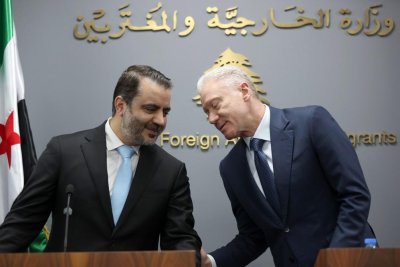
Lebanese Minister of Foreign Affairs and Emigrants Youssef Rajji (R) talks with his Syrian counterpart, Asaad Al Shaibani, during a press conference after their meeting at the Lebanese Foreign Ministry in Beirut, Lebanon, on Friday. Shaibani is on an official visit to Beirut to meet Lebanon’s leaders. Photo by Wael Hamzeh/EPA
BEIRUT, Lebanon, Oct. 10 (UPI) — Lebanon and Syria announced Friday the opening of a new chapter in their relations nearly 10 months after the ouster of Syrian President Bashar Assad.
This marks an attempt to move away from decades of tense ties, characterized by political domination and military interference, toward building a strong political and economic partnership.
Syrian Foreign Minister Asaad al-Shibani, the first high-ranking Syrian official to visit Lebanon since Assad was overthrown by rebel insurgents in December, said a historic, political and economic opportunity exists to transform the Lebanese-Syrian relationship from “a tense, security-based one into a strong political and economic partnership” that benefits both countries.
“We look forward to turning the page on the past because we want to build the future,” al-Shibani said, reaffirming his country’s respect for Lebanon’s sovereignty and its commitment to establishing strong bilateral relations.
Earlier Friday, Syria told Lebanon it decided to suspend the work of the Lebanese-Syrian Higher Council and limit all forms of correspondence between the two countries to official diplomatic channels.
The council was established in 1991, after Syria — under the late President Hafez Assad — imposed itself as the main power broker in Lebanon, having been granted a guardianship role after the civil war ended a year earlier.
Lebanon has suffered from a decades-long Syrian military presence — which began in 1976, shortly after the outbreak of the civil strife — along with political domination and manipulation that deeply affected its governance, political life, economy and overall stability.
Syria also was accused of being behind the 2005 assassination of Lebanese Prime Minister Rafik Hariri and numerous other such killings during the civil war and in peace time. Its influence over Lebanon began to wane rapidly following the withdrawal of its troops in 2005 and the outbreak of anti-Assad peaceful protests in 2011, which soon escalated into a bloody civil war.
Syrians, for their part, harbor grudges against Hezbollah — and its patron, Iran –for siding with the Assad regime and joining the brutal battles against opposition fighters starting in 2012. The involvement of Hezbollah and Iran in Syria ended with Assad’s fall.
“Our peoples have suffered from wars and tragedies; let us try peace,” al-Shibani said after talks with Lebanese President Joseph Aoun, calling for strengthened cooperation in all fields so that Lebanon can benefit from the lifting of international sanctions on Syria.
Aoun, who called for the appointment of a new Syrian ambassador to Lebanon — a post vacant since the fall of Assad — said that deepening and developing bilateral relations requires the formation of joint committees to address all outstanding issues.
Both countries have undergone major changes and are working to resolve several complex issues, including the case of over 2,000 Syrian detainees in Lebanese prisons, the fate of numerous Lebanese prisoners or missing persons in Syria, the return of 1.5 million Syrian refugees from Lebanon to their homeland, the demarcation of land and maritime borders, and joint efforts to combat drug trafficking and terrorism.
“We have a long road ahead of us. …. We have no choice but to agree on what serves these mutual interests,” Aoun said, noting that the situation along the Lebanese-Syrian border has improved.
Al Shibani, accompanied by Syrian Justice Minister Mazhar al-Wais, the head of Syrian intelligence, Hussein al-Salama; and the assistant interior minister, Maj. Gen. Abdel Qader Tahan, said all these issues were “certainly top priorities” and that committees from both countries are reviewing them.
The Syrian foreign minister, who also met with his Lebanese counterpart, Joe Rajji, and Prime Minister Nawaf Salam, emphasized the importance of enhancing security and intelligence coordination, as well as forming technical and economic committees across the public and private sectors to support Syria’s post-war reconstruction.
“Syria is undergoing a phase of recovery and reconstruction, which should positively reflect on Lebanon,” al-Shibani said.
Rajji praised Syria’s new leadership for respecting Lebanon’s sovereignty and refraining from interference in its internal affairs, adding, “We will work together to open a new path based on peace, security, economic cooperation and joint development.”
Deputy Prime Minister Tarek Mitri, who attended the meeting between al-Shibani and Salam, said both countries demonstrated “political will” to address every issue “without taboos.”
“We have opened a new chapter in Lebanese-Syrian relations unlike any seen in the past fifty years,” Mitri said in an official statement released after the meeting.